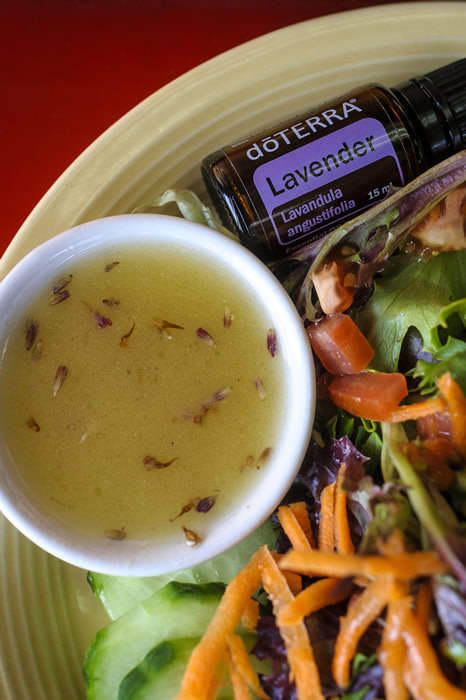tips & tricks
INFUSE YOUR FOOD
Cooking with essential oils.
WRITTEN BY SARAH PARKS
PHOTOS BY CANDICE VIVIEN
Nancy Horn, owner and chef of Dish Café in Reno, presents her lemon cupcakes made with dōTERRA lemon essential oil
When it comes to wellness, it seems the phrase “essential oils” is on everyone’s tongue. Derived from a plant’s natural defense system, essential oils have extraordinary and powerful flavors that are said to offer an abundance of health and wellness benefits.
Essential oils are aromatic compounds that are found in the leaves, roots, seeds, or flowers of a plant that have been extracted or distilled for a variety of health reasons. These oils can be applied topically, diffused, or incorporated into food and drinks and ingested.
Carol O’Brien and Nancy Horn, co-founders of Renō’s Essential Oil Community, are dedicated to educating people in Northern Nevada about the benefits of using essential oils in cooking.
“With essential oils, the food becomes nourishing instead of just filling, and is actually beneficial to your mind, body, and spirit,” Horn says.
Enhancing flavor
Horn, who also is owner and chef of Dish Café and Catering in Reno, cooks with oils both at home and in her restaurant to encourage a healthy lifestyle.
Flavors such as oregano, thyme, lemon, and black pepper can be used in cooking to replace or complement traditional spices.
“When you use essential oils, you add them in as you would natural herbs, citrus, or spices,” Horn says. “They then work to intensify the flavor of that food while making it more nutritious and better for your body.”
Natural, healthy lifestyle
Not only do essential oils taste good, but they also are rich in a wide variety of health benefits. Fresh herbs are natural antibiotics; they are filled with antioxidants and have anti-fungal, anti-inflammatory, and anti-viral properties. In their pure, concentrated form, essential oils enrich these benefits to support a natural and healthy lifestyle. A growing body of laboratory evidence suggests that certain essential oils may help to kill bacteria and fungi, soothe pain, reduce coughs, and more.
According to O’Brien, the oils don’t heal your body, but help it heal itself.
“The oils protect your body. They boost your body’s immune system, and they also reduce the inflammatory response,” O’Brien says. “They give us an opportunity to enrich the flavors in food, and then you get the health benefits from them at the same time.”
With all these benefits, O’Brien and Horn are firm believers in the versatility of these aromatic compounds.
“Essential oils are good for you and help the body fight disease and inflammation,” Horn says. “They enhance your mood, they help you get nutrients out of your food, and they can replace your spice rack.”
Using a couple drops of lemon and wild orange in her water, freelance writer Sarah Parks feels encouraged to pursue a healthy lifestyle with oils.
Resouces
Tips for cooking with essential oils
1. Enhance recipes you already have. You can easily substitute spices you use with oils to get enriched flavors.
2. Less is more. Always start with less because once the oils are in there, you can’t get them out.
3. Use oils as seasonings at the end of cooking, rather than during.
4. Use a vehicle to mix your oils into food and drink. Don’t put it directly in batter or on your meat. Mix the oils with olive oil, marinade, butter, or fat.
5. Do your research and make sure you use a brand approved for ingestion, such as dōTERRA.
Visit Renō’s Essential Oil Community at 3100 Mill St., Ste. 104 in Reno. For details about upcoming educational classes, find the business on Facebook.
Recipes
Dish Café and Catering Basic Vinaigrette
(courtesy of Nancy Horn, owner and chef, Dish Café and Catering in Reno. Makes ¾ cup, or about 4 to 6 servings)

1 garlic clove or small shallot, peeled and finely minced or grated on microplane
1 tablespoon Dijon mustard (Get real Dijon, made with white wine, not Dijon-style.)
¼ teaspoon kosher salt (or less if you’re using lemon juice)*
½ teaspoon black pepper, freshly ground
4 tablespoons vinegar or a combination of vinegar and lemon juice
½ cup extra-virgin olive oil or a combination of olive oil and a nut oil
2 drops of any citrus essential oil, such as lemon, lime, grapefruit, wild orange, or tangerine, for added flavor and healthfulness
In a small bowl, put all ingredients except olive oil. Whisk well with a small whisk or mix in a blender. Stream in the olive oil very slowly while whisking continuously, or pour through lid opening with blender running. Taste and re-season with salt and pepper, or add more of any ingredient you like, to your taste.
*Note: Season food with lemon juice to use less salt.


